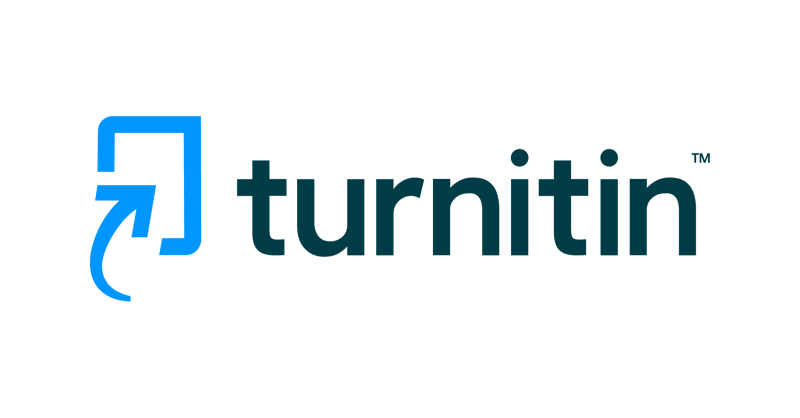Determinants of Farm Women's Participation in Shallot Farming and Processing Activities
Abstract
Women farmers' participation is considered important for the development of shallot farming. Therefore, this study aims to analyze the factors that influence farm women's participation in shallot farming and processing activities in Selopamioro Village. Farm women's participation was calculated based on four stages of participation, namely participation in decision-making, implementation, benefit-taking, and evaluation. This study involved 50 farm women to be the sample in the study, which focused on Nawungan I and Nawungan II hamlets. This research was conducted using a quantitative approach, where there were 2 tests, namely the proportion test and multiple linear regression. The results of this study show that more than 50% of farm women have a high level of participation in shallot farming and processing activities. The highest level of participation is in the third stage, namely participation in benefit taking. Factors that significantly influence farm women's participation include motivation, cosmopolitan level, and intensity of attending extension services.
References
Asyahidu, T. (2018). Partisipasi Wanita Tani dalam Program Kawasan Rumah Pangan Lestari (KRPL) di Desa Jambewangi Kecamatan Selopuro Kabupaten Blitar [Universitas Brawijaya].
Azwar, A., Muljono, P., & Herawati, T. (2016). Persepsi dan Partisipasi Petani dalam Pelaksanaan Rehabilitasi Tanaman Kakao di Kabupaten Sigi Provinsi Sulawesi Tengah. Jurnal Penyuluhan, 12(2), 157. https://doi.org/10.25015/penyuluhan.v12i2.13466
Hamid, H. (2018). Manajemen Pemberdayaan Masyarakat. In De La Macca (Vol. 1, Issue 1). De La Macca.
Harahap, I. P. A., Rosnita, & Yulida, R. (2015). Curahan waktu wanita tani dan kontribusinya terhadap pendapatan keluarga di Desa Muara Lembu Kecamatan Singingi Kabupaten Kuantan Singingi (studi kasus buruh tani perkebunan karet). 2(1), 1–10. https://doi.org/10.3969/j.issn.1008-0813.2015.03.002
Hermayenti, F. (2018). Partisipasi anggota kelompok wanita tani Ngudisari dalam pengolahan tepung mocaf di Dusun Kemiri, Desa Kemiri, Kecamatan Tanjungsari, Kabupaten Gunungkidul. Universitas Muhammadiyah Yogyakarta.
Lestari, R. D., & Suhatmi, E. C. (2020). Curahan Tenaga Kerja Wanita tani dan Hubungannya dengan Pendapatan Rumah Tangga Petani Bawang Merah di Kabupaten Bojonegoro. Prosiding HUBISINTEK, 1, 174–180. http://ojs.udb.ac.id/index.php/HUBISINTEK/article/view/993
Muthia, M., Evahelda, E., & Setiawan, I. (2020). Partisipasi Anggota Kelompok Wanita Tani (Kwt) Dalam Program Kawasan Rumah Pangan Lestari (Krpl) Di Kecamatan Merawang Kabupaten Bangka. Journal of Integrated Agribusiness, 2(1), 47–61. https://doi.org/10.33019/jia.v2i1.1135
Puspaningrum, D., & Agustina, T. (2018). Prospek Dan Strategi Pengembangan Kopi Arabika Specialty Ketinggian Sedang Berbasis Kawasan Di Kabupaten Jember. JSEP (Journal of Social and Agricultural Economics), 9(3), 56–66. https://doi.org/10.19184/jsep.v9i3.6494
Samosir, N. dkk. (2014). Analisa Metode Backward Dan Metode Forward Untuk Menentukan. 2(4), 345–360.
Sopamena, J. F. (2020). Women and Onion Farming in Lakor Island, Southwest Maluku Regency. SOCA: Jurnal Sosial, Ekonomi Pertanian, 14(2), 265. https://doi.org/10.24843/soca.2020.v14.i02.p07
Suharyani, A., & Oktoriana, S. (2018). Pengaruh tingkat imitasi dan kosmopolitan wanita tani terhadap keputusan pengelolaan usahatani. AGRIFO, 3(2), 1–7.
Uliya, Harimurti, S., Rusnani, & Erwandri, E. (2021). Analisis Faktor-Faktor Yang Mempengaruhi Partisipasi Wanita Tani Dalam Kegiatan Usaha Tani Padi Sawah di Desa Benteng Rendah Kecamatan Mersam Kabupaten Batang Hari. Jurnal Ilmiah Ilmu Terapan Universitas Jambi, 5(2), 193–204.
Wanna, & Djadir. (2016). Comparison of the Effectivines of Cooperative Learning Two Stay Two Stray and Jigsaw Type With Scientific Approach on Learning Mathematics Learning To Grade Xi Mia At Man Pangkep. Jurnal Daya Matematis, 4(3), 280–305. https://doi.org/10.26858/jds.v4i3.2903

This work is licensed under a Creative Commons Attribution-ShareAlike 4.0 International License.
Jurnal Sosial Ekonomi Pertanian (J-SEP) has CC-BY-SA or an equivalent license as the optimal license for the publication, distribution, use, and reuse of scholarly work.
The work is simultaneously licensed under a Creative Commons Attribution-ShareAlike 4.0 International License, which permits others to share the work with an acknowledgement of the authorship and the work's initial publication in this journal. Authors who publish with this journal retain their copyright and grant the journal the right of first publication.

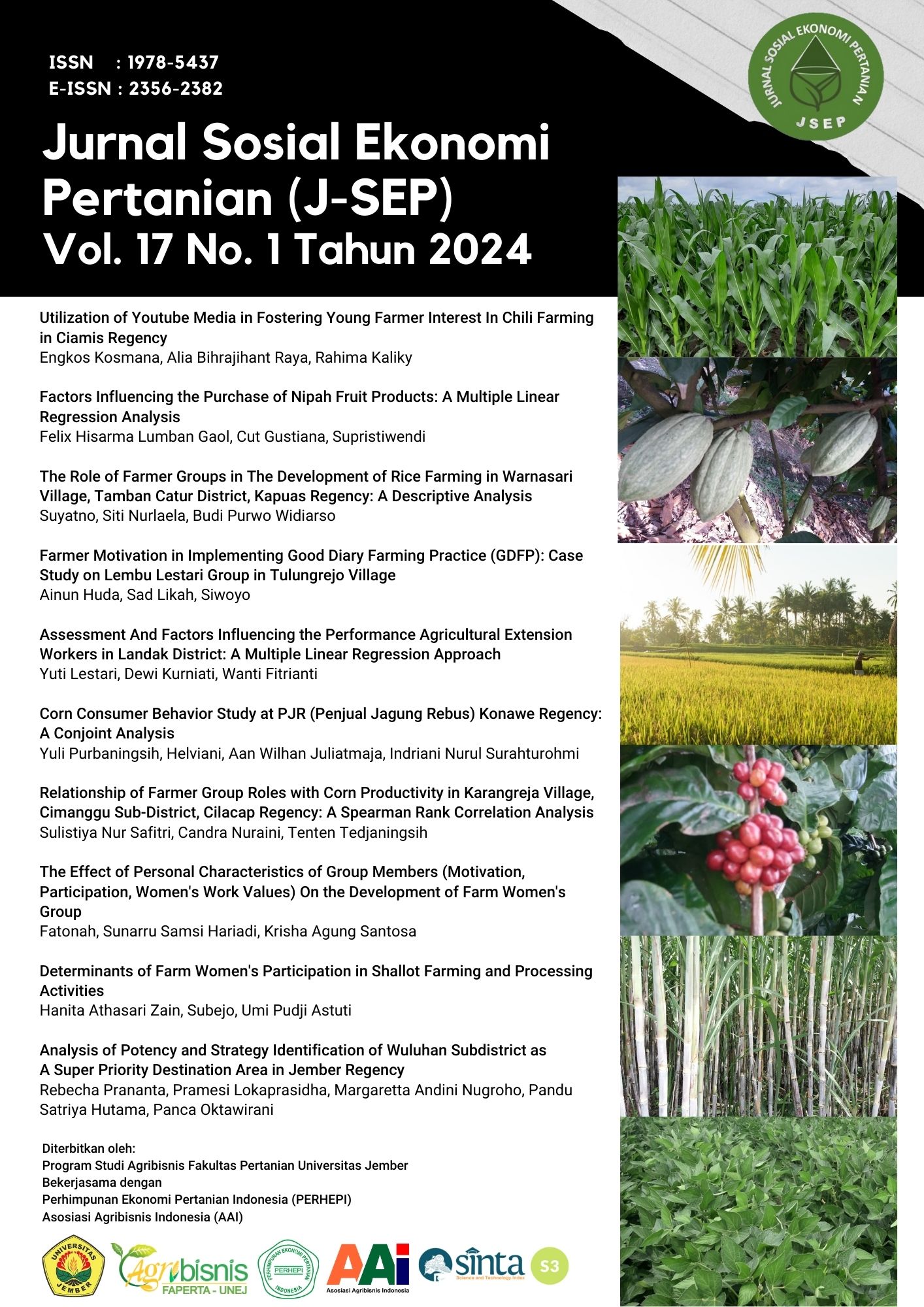
3.png)

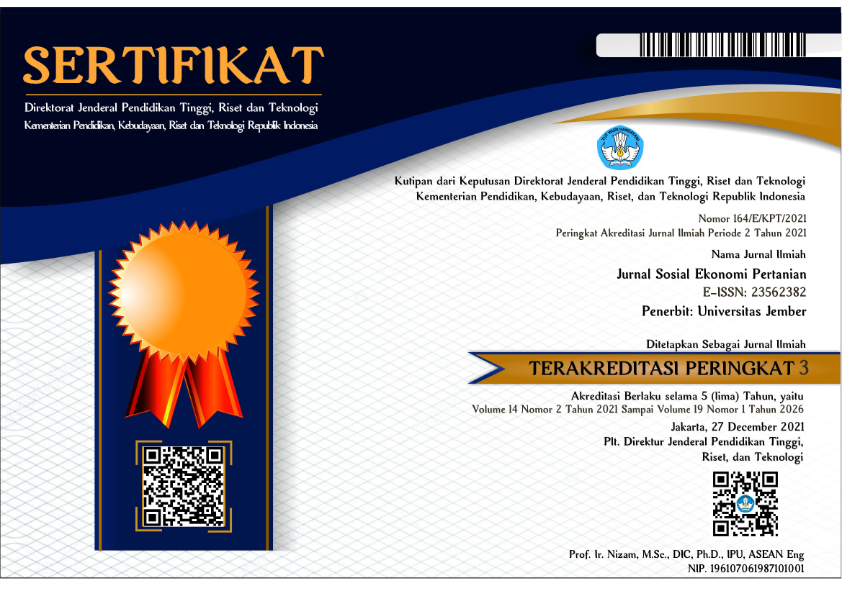
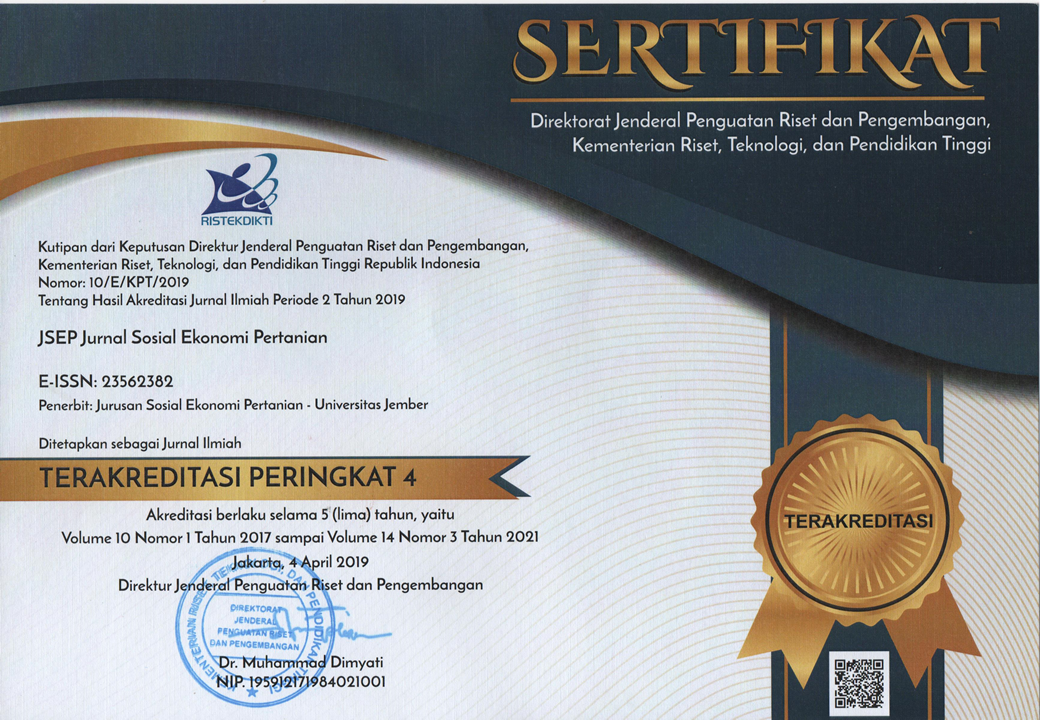
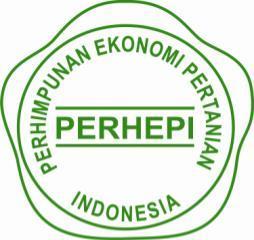
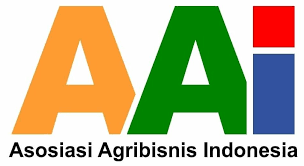

.png)










